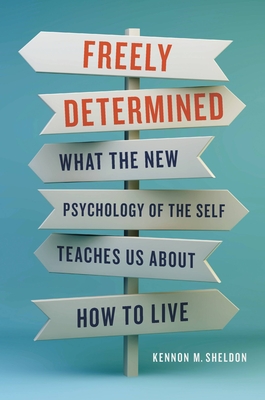What do you think?
Rate this book


272 pages, Hardcover
Published November 1, 2022
[Imported automatically from my blog. Some formatting there may not have translated here.]
Putting my cards on the table: I'm a believer in what the philosophers call "libertarian" free will. And I use the term "believer" because (sigh) I don't have any solid knock-down evidence to throw up against the (so-called) "determinists".
Other than to say: "Hey, if you don't believe in free will, that's OK; that's your choice." And then walk away chuckling at this very cheap shot.
Bur I like to read on both sides of the issue, so when I noticed this book on the new nonfiction table at Portsmouth Public Library, I picked it up. It's by Ken Sheldon, psychology professor at the University of Missouri. It contains an interesting mix: there's a pro-free will argument, but—see the subtitle—there's also a strong component of self-help advice.
I used to think that belief in determinism was essentially one that had no effect on one's daily life. No matter how solid that belief, you still have to make decisions, from mundane ones (what shirt to wear, how much cream cheese to put on that bagel, …) to the life-altering ones (which career path to pursue, who/whether to marry, …). And (I thought) determinists pretty much go through the same mental processes that I do when making decisions. There's no avoiding it, is there? Net result is the same.
But Sheldon cites research that indicates otherwise: free will believers tend to be happier and healthier. (And more honest: one study had participants read a pro-determinism article, then take a math skills test. They were more likely to cheat on that test than the control group.) So even if free will doesn't exist, pilgrim, you're better off believing in it anyway.
Sheldon locates the seat of free will in the "symbolic self": "our sense of ourselves as self-aware agents living a story, playing our roles in the world, and deciding what to do and say next." He locates the symbolic self as an emergent property of human neurophysiology. Somewhat like "life" is an emergent property of plain old unliving molecules arranged into cells, organs, …. And (similar) human society and culture is an energent property of individual human interactions, its behavior unpredictable from knowledge of individuals.
And (to me) that makes sense. His strongest argument (I think) is what he calls "the grand hierarchy of human reality", which has causal arrows working both ways, up and down. (There's a nice diagram on page 45, which I'm too lazy to scan in. Trust me.)
A side discussion of interest, getting more relevant every day: what about AI? Could they exhibit free will? Sheldon says sure, why not. And speculates from there. Data from Star Trek: The Next Generation is referenced.
As mentioned, there's a strong component of self-help in the book, as indicated by the "how to live" in the subtitle. I admit I found that ("at my age") less interesting; Ken, if I haven't figured out "how to live" by now, it's unlikely to happen at all, sorry.